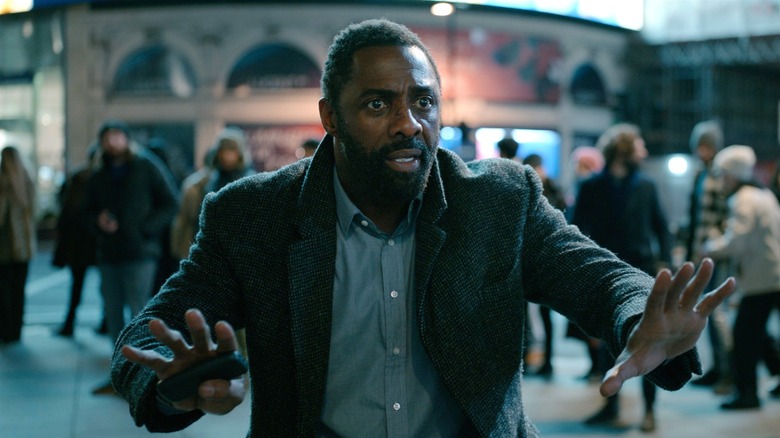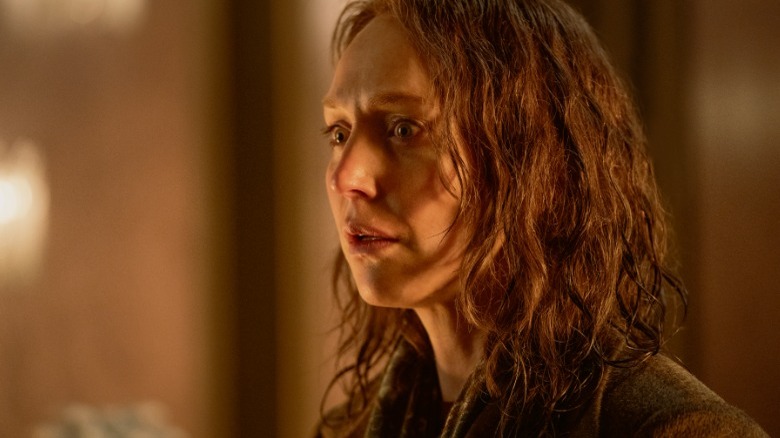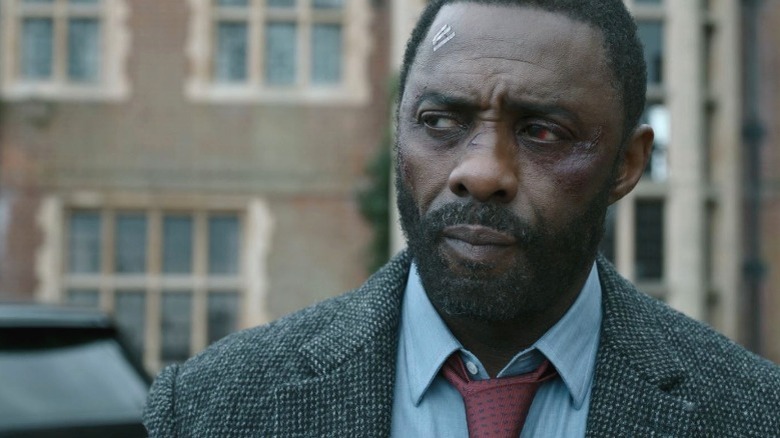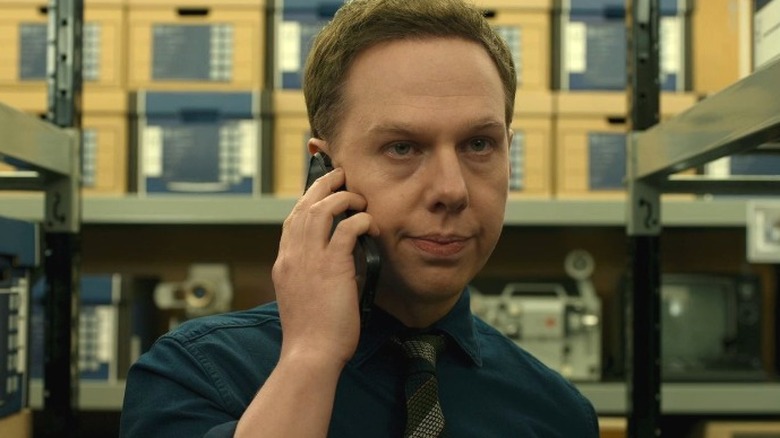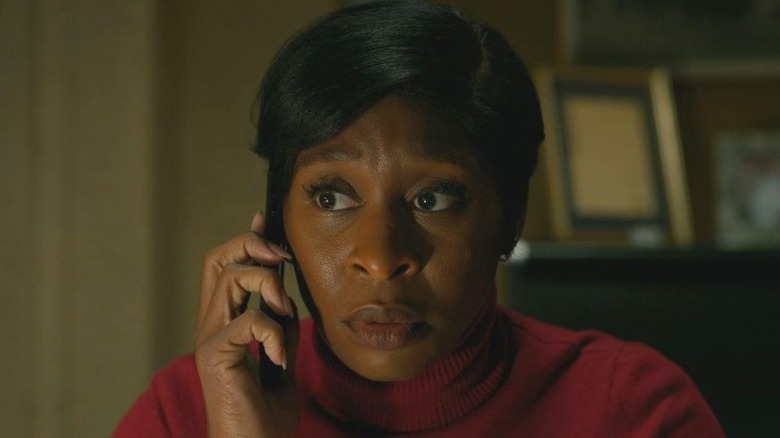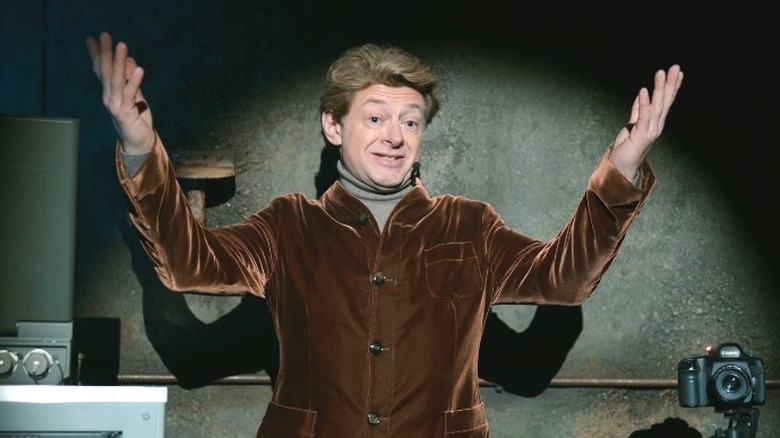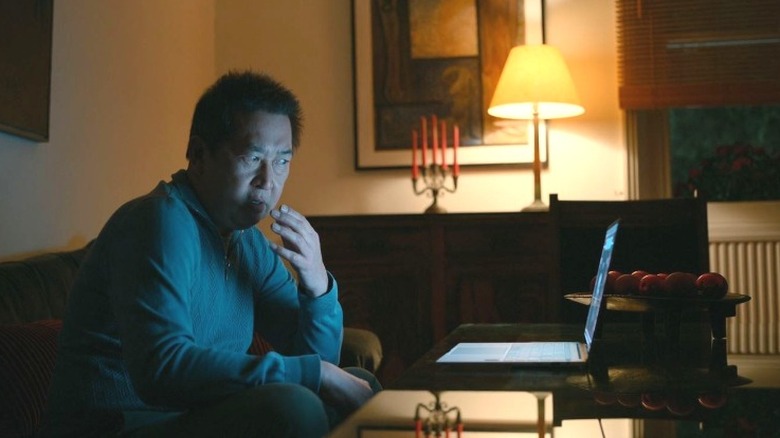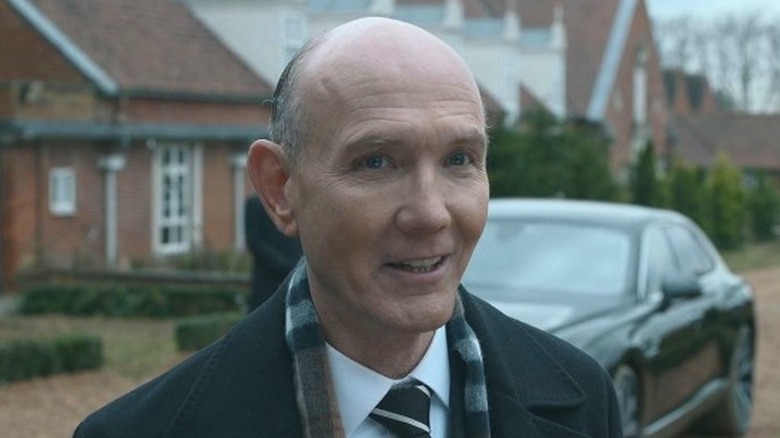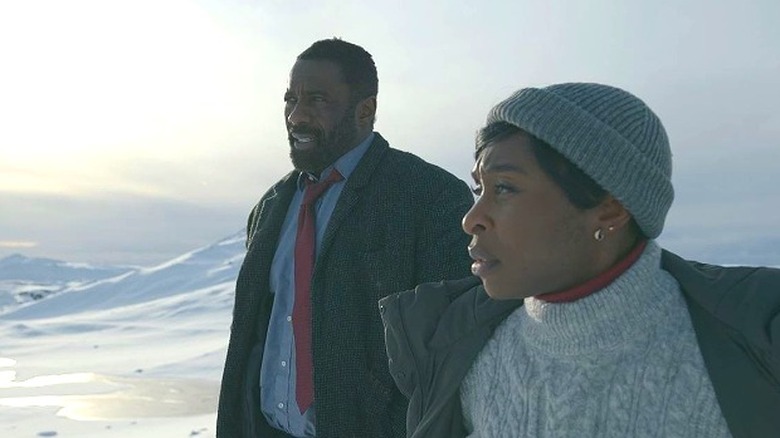Luther: The Fallen Sun Ending Explained
After several years of rumors and changes of plans, the movie sequel to the popular BBC TV show "Luther" is finally here. "Luther: The Fallen Sun" portrays Detective Chief Inspector John Luther's efforts to capture a calculating serial killer. The new film sees Idris Elba's Luther face off against Andy Serkis' David Robey, a serial killer with millions of dollars, all while several double agents work tirelessly to stop the detective from ruining Robey's plans. Played by acclaimed actor Andy Serkis, Robey manages to force the police to imprison Luther while infiltrating the task force trying to stop him, becoming one of the strongest enemies the detective has ever faced.
While the Netflix film is a sequel to the original TV show, it works as a stand-alone film that even viewers not familiar with the story of Luther can enjoy. The story is well-paced, the film features some excellent cinematography, and the entire experience showcases top-tier performances from both original and new cast members. It is also filled with thrilling action scenes, complex moral dilemmas, and characters facing their worst fears. However, in order to fully understand the significance of various character arcs, themes, and overall implications for the future of the series, it's necessary to take a closer look at how every shakes out.
Here is the ending of "Luther: The Fallen Sun" explained.
Corinne learns the serial killer can be even crueler than she originally thought
Despite being known for his explosive temper, Luther also understands the importance of being kind to people. At the beginning of the movie, he approaches Corinne Aldrich, the mother of the serial killer's latest kidnapping victim, and tries to make her feel better by promising he will find her son. Sadly, Luther doesn't anticipate being arrested for his past misbehaviors while working for the police. As a result, the kidnapping remains unsolved, and Corinne has to discover the passing of his son in a particularly gruesome way. This leads her to resent Luther and go as far as visiting him in prison to call him a liar for breaking his promise.
Luther will have another chance at gaining Corinne's trust, though. After he escapes prison and misses a chance to capture the serial killer, he comes up with the theory. Given the murderer's fascination with witnessing the suffering the families of the victims go through, Luther concludes that he might have befriended some of them. He shares this idea with Corinne, who confirms she met a man named Tommy in a support group, who expressed sympathy for her loss and drove her to prison to confront Luther.
After the horrifying realization that the serial killer enjoys watching her suffer in her everyday life, she is devastated but also convinced that she wants to help Luther catch the man.
Luther's unrelenting efforts to capture the killer are a sign of his self-destructive personality
At the beginning of the movie, Luther is arrested for several incidents that occurred while he was a detective. He is accused of intimidating suspects, altering evidence, and even bribery — acts that his peers chose to ignore when they happened because of how effective Luther's methods proved to be at solving seemingly unsolvable crimes. However, these actions are also a sign of the impulsivity and obsessiveness that make Luther both a great detective but also an incredibly self-destructive individual. In fact, the movie provides numerous examples of this risk-taking attitude.
Despite being sentenced and imprisoned, Luther doesn't stop thinking about the case. He's so convinced that he can find the serial killer that he is willing to let the other prisoners beat him up and potentially murder him in order to force a transfer to another facility from which he plans to escape. He is also seen pursuing an armed serial killer, despite him not carrying any weapon, while being followed by the police who could open fire on him at any time.
Finally, toward the end of the film, he and Robey fall into a freezing lake while fighting in a car, and Luther seems much more concerned with not letting the serial killer escape from the car than with saving himself. In other words, Luther's propensity to risk his life seems to be a symptom of both his obsession with stopping murderers and also of a general lack of interest in self-preservation.
People will do anything to keep their secrets from being revealed
From the very beginning of "Luther: The Fallen Sun," the serial killer shows he has an impressive ability to persuade his victims to do what he wants. He uses blackmail to convince Corinne's son to meet him in the middle of the night and later uses the sound of his voice pleading for help to trick Corinne into entering the house where the bodies are about to be burned. His ability to manipulate people goes as far as forcing a member of the task force investigating the crimes to work as a double agent and even getting DCI Odette Raine to trick Luther into meeting with her with the intent of stopping him. Eventually, however, audiences discover that his ability to gain control over people is mostly based on his access to personal information.
The serial killer is eventually revealed to be David Robey, a millionaire with access to a team of surveillance experts who specialize in collecting information on upper-class individuals. He keeps files that record any type of recorded behavior the men and women being spied on might want to keep hidden. When used on individuals who are susceptible to manipulation, this method grants Robey almost absolute control over people.
We see, for example, that Robey can make people commit murder or jump to their deaths in order to avoid the shame of their darkest secrets being made public. However, perhaps the most terrifying aspect of all this information is that, as DS Archie Woodward puts it, some of these secrets are really not even that bad. However, Robey has mastered the ability to play with people's fears and turn himself into a formidable threat.
DCI Odette Raine learns that good people can take desperate measures to stop a killer
Luther's previous co-workers may have been willing to overlook his crimes, but this is not the case with the new team, and DCI Odette Raine, in particular, has a very negative opinion of Luther. Instead of seeing Luther as a legendary detective, Raine considers him to be nothing more than a dirty cop and gets angry when he implies that the murder of Corinne's son is still his case. Raine can't see a situation in which Luther's extreme measures would be considered justified. Yet, as David Robey tries to extend his influence over the police, she eventually finds herself breaking the law as well.
After realizing how close Luther was to catching him in Piccadilly Circus, Robey concludes he needs to take him out of the picture as soon as possible. In order to do this, he kidnaps Raine's daughter and, just like he did to the other victims, sends Raine a recording of her desperate pleas for help. Realizing that the killer can end her daughter's life in an instant, she decides to obey him and trick Luther into meeting with her in order to find a way of getting rid of him.
When the time comes though, a frustrated Odette decides to ask for the former detective's help, a risky choice that will eventually lead both of them to confront the man behind the murders.
Robey reveals he hates the police because they can hurt people through legal means
David Robey is a man obsessed with gaining power over people and seeing them suffer because of it. However, he doesn't see himself or others like him as a monster. Instead, he argues that the only difference between serial killers and the police is that the latter is allowed to hurt people under the right circumstances. This is why he creates the Red Bunker, a space where he tortures and kills people while streaming the murders to individuals who share his impulses. However, this also explains the way he treats Raine and Luther.
As Andy Serkis explains in an interview for Virgin Radio UK, Robey is on a mission to punish individuals that he considers hypocrites. In his eyes, John Luther is a perfect example of what is wrong with the police, as he is able to intimidate and hurt people in the name of a greater cause. This is why Robey finds it so satisfying to see Luther and Raine, two representatives of the police force that he despises so much, hurting each other in order to prevent him from killing Raine's captive daughter.
By masterminding this situation, Robey is not only providing entertainment for his deeply disturbed audience — he is also punishing individuals who are constantly hunting people like himself and treating them as monsters.
Only deeply disturbed people would watch a livestream of a murder
"Luther: The Fallen Sun" isn't the first movie to depict a serial killer who broadcasts his murders. The 2008 Diane Lane vehicle "Untraceable," for example, tells the story of an FBI agent trying to stop a serial killer who allows people to choose the way his victims will die and then shows them the results in a video stream. Instead of suggesting that everyday people would join such a broadcast, "Luther: The Fallen Sun" implies that only people with a twisted desire to see others being tortured and killed — making them potential serial killers — will actually participate in viewing the livestream.
The movie makes it absolutely clear that the men watching Robey's live feed are deeply disturbed individuals. The camera shows not just how invested they are in every second of the broadcast — it also shows them reacting with an eerie display of satisfaction when Raine stabs Luther to save her daughter. However, the same men listening to Robey's every word abandon the stream as soon as Luther explains that their addresses are being tracked down by the police.
With nobody following his red room broadcast, Robey becomes increasingly frustrated, leaving Luther enough room to distract him.
Luther defeats Robey by turning his favorite manipulation technique against him
During most of the movie, David Robey appears to be a terribly confident man, and with good reason. He is a millionaire who collects valuable secrets from people within the top five percent of earners and is capable of manipulating not only those individuals but also people who work within the police force itself. Thanks to this, almost everything he does goes pretty much according to his plans. He reveals a dossier that forces the police to arrest Luther, manipulates a man into broadcasting the recordings of his murders through radio waves, and effectively surprises the police with multiple coordinated suicides in the middle of the city. However, it eventually becomes clear that Robey isn't as untouchable as he might have hoped.
During their conversation with Robey's ex-wife Georgette, Luther and Raine learn a few things about the serial killer. He seems to suffer from anxiety, a problem that tends to manifest in the form of teeth grinding. Robey also appears to be deeply embarrassed by the fact that he hasn't been able to control this symptom. This makes Luther realize that, while Robey has so far succeeded at manipulating people by using their fear of finding their embarrassing secrets revealed, Luther can use the serial killer's own insecurities against him to gain an advantage.
As Luther slowly starts to reveal Robey's weaknesses, the serial killer can't stop himself from exploding in anger and trying to attack Luther. This presents an opportunity for the detective to subdue his captors and try to bring Robey to justice.
The open ending suggests Luther will continue to work as a government agent
John Luther has always been portrayed as a character facing an uphill battle. However, in "Luther: The Fallen Sun," he starts his journey under particularly difficult circumstances. He has been expelled from the force and is replaced in his role as DCI. Before long, he has his freedom taken away from him after he is thrown in jail for the illegal acts he committed while chasing criminals. Even after Luther escapes prison, he still has to worry about avoiding any sort of real police presence while frequently following the same leads as them, all while ignoring the pain from multiple wounds acquired during his encounters with the serial killer. Of course, despite all these hardships, Luther persists and ultimately stops Robey.
Curiously, while Luther seems to have problems enduring these obstacles, he doesn't seem worried about the fact that he will have to return to prison after the case ends. In fact, after he's rescued from the freezing lake where he fought Robey, Luther makes no attempt at escaping from the authorities and seems to have accepted his fate.
In an unexpected turn, however, the former detective wakes up in an undisclosed facility where he is greeted by a government agent with an offer. Viewers never get to see who this person is, but the scene suggests that his talents may grant him either a pardon or work as an undercover agent, opening the door for further adventures for the unrelenting detective.
The release of Luther: The Fallen Sun gives hope to fans of other canceled TV series
The original "Luther" series went through a very peculiar production schedule. Season 1 was released in 2010, with the following three seasons being released within a four-year period. After this, fans had to wait another five years to see the fifth and apparently last season. There were always rumors of a potential sequel in the form of a movie, but it took a while for the project to get off the ground. Finally, the production of "Luther: The Fallen Sun" was announced in 2021 by Netflix, and the movie was finally released in 2023.
Several series have followed a similar process. TV shows such as "Entourage," "Breaking Bad," and even "Beavis and Butt-Head" had their series finales followed by the release of a feature film, sometimes several years after those finales had aired. Productions like "Luther: The Fallen Sun" give hope to some series that have a considerable following but didn't get to see a proper live-action ending.
Fans of series like "Hannibal," "The Last Man on Earth," and "The Expanse" would love to watch the movie continue the story where it was left off. Of course, this type of production will only see the light of day if streaming services like Netflix believe they will be popular enough to attract new subscribers — something that the company felt confident enough in to give the green light to "Luther: The Fallen Sun."
